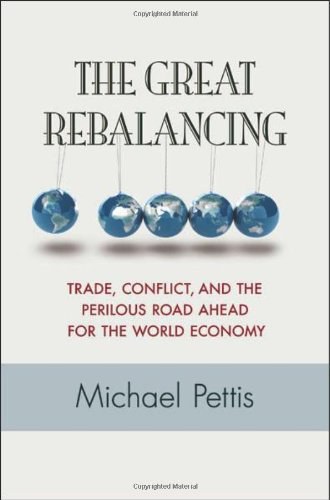
书名:The Great RebalancingTrade,Conflict,andthePerilousRoadAheadfortheWorldEconomy
作者:MichaelPettis
译者:
ISBN:9780691158686
出版社:PrincetonUniversityPress
出版时间:2013-1-22
格式:epub/mobi/azw3/pdf
页数:216
豆瓣评分: 8.0
书籍简介:
China's economic growth is sputtering, the Euro is under threat, and the United States is combating serious trade disadvantages. Another Great Depression? Not quite. Noted economist and China expert Michael Pettis argues instead that we are undergoing a critical rebalancing of the world economies. Debunking popular misconceptions, Pettis shows that severe trade imbalances spurred on the recent financial crisis and were the result of unfortunate policies that distorted the savings and consumption patterns of certain nations. Pettis examines the reasons behind these destabilizing policies, and he predicts severe economic dislocations–a lost decade for China, the breaking of the Euro, and a receding of the U.S. dollar–that will have long-lasting effects. Pettis explains how China has maintained massive–but unsustainable–investment growth by artificially lowering the cost of capital. He discusses how Germany is endangering the Euro by favoring its own development at the expense of its neighbors. And he looks at how the U.S. dollar's role as the world's reserve currency burdens America's economy. Although various imbalances may seem unrelated, Pettis shows that all of them–including the U.S. consumption binge, surging debt in Europe, China's investment orgy, Japan's long stagnation, and the commodity boom in Latin America–are closely tied together, and that it will be impossible to resolve any issue without forcing a resolution for all. Demonstrating how economic policies can carry negative repercussions the world over, The Great Rebalancing sheds urgent light on our globally linked economic future.
作者简介:
Michael Pettis is professor of finance and economics at Peking University, a senior associate at the Carnegie Endowment, and a widely read commentator on China, Europe, and the global economy. He is the author of The Volatility Machine: Emerging Economies and the Threat of Financial Collapse.
书友短评:
@ 逆铭睡眼惺忪地 A powerful illustration of how little understanding most analysts have of economics. Through accounting identifies and economic history, Pettis masterfully explains the forces underlying forces shaping international economics and in so doing, blows away one cliche after another about China's place in the world. @ HIAHIA 在我看来在这本书貌似更像个读后感,接触Michael本人多了才能体会到这些感觉的来源到底来自何处,对于启发和思考都很有帮助,尽管你发现你的想法有时和他并不完全一样。 @ Lalalallz 很有启发的论点。很多细节、机制还需深挖和探讨,虽然这些探讨已经不是一本书能展现的。 @ 地下宇航员 7/10. 开创“收入效应+会计恒等式解释一切”流。有一定启发性。其中收入效应的解释力其实用储蓄消费的微观数据其实不难检验,但相关讨论很少,能不能hold up我不太乐观。 @ Deenoir 需要認真學習。重复太多,写几篇论文/blog显然是作者更喜欢的方式。 美国,近欧国家,德,中,日案例学习,不太清楚具体情况现在是什么,可是没有作者期待的解决方案在真的实行吧(起码中国是烷)。非常有帮助的基本框架。 @ 逆铭睡眼惺忪地 外行表示不明觉厉。。似乎要先去补补宏观经济学 @ 冷眼旁观 很精彩的书,预测基本与现实一致,在如何分配过剩储蓄的角度解读贸易失衡。目前可选择的唯一正确再平衡路径,应是在财富转移(减税)的基础上刺激消费,接受短期经济增速下滑。
CHAPTER ONE Trade Imbalances and the Global Financial Crisis 1
Underconsumption 4
The Different Explanations of Trade Imbalance 6
Destabilizing Imbalances 9
We Have the Tools 11
Why the Confusion? 14
Some Accounting Identities 17
The Inanity of Moralizing 19
The New Economic Writing 22
CHAPTER TWO How Does Trade Intervention Work? 26
Trade Intervention Affects the Savings Rate 29
Currency Manipulation 32
Exporting Capital Means Importing Demand 34
What Happens If China Revalues the Renminbi? 37
Wealth Is Transferred within China 40
Does China Need a Social Safety Net? 42
CHAPTER THREE The Many Forms of Trade Intervention 47
How Changes in Wealth Affect Savings 50
Wage Growth 52
Trade Policy as the Implicit Consequence of Transfers 55
Financial Repression 58
Higher Interest Rates and Household Wealth 61
Do Higher Interest Rates Stimulate or Reduce Consumption? 64
Currency versus Interest Rates 66
CHAPTER FOUR The Case of Unbalanced
Growth in China 69
What Kind of Imbalance? 74
Growth Miracles Are Not New 78
The Brazilian Miracle 81
Powering Growth 84
Paying for Subsidies 87
Limits to Backwardness 89
The Trade Impact 92
A Lost Decade? 94
Can China Manage the Transition More Efficiently? 96
Some More Misconceptions 97
CHAPTER FIVE The Other Side of the Imbalances 100
Can Europe Change American Savings Rates? 103
How Does Trade Rebalance? 106
Globalization Is Not Bilateral 109
The Global Shopping Spree 113
Trade Remains Unbalanced 115
CHAPTER SIX The Case of Europe 119
The Mechanics of Crisis 122
Too Late 125
German Thrift 128
Forcing Germany to Adjust 131
Two-Sided Adjustment 133
CHAPTER SEVEN Foreign Capital, Go Home! 136
Swapping Assets 139
It's about Trade, Not Capital 142
Trade Imbalances Lead to Debt Imbalances 144
The Current Account Dilemma 147
CHAPTER EIGHT The Exorbitant Burden 150
Why Buy Dollars? 153
It Is Better to Give Than to Receive 157
Foreigners Fund Current Account Deficits, Not Fiscal Deficits 161
Rebalancing the Scales 163
When Are Net Capital Inflows a Good Thing? 166
Can We Live without the Dollar? 168
Why Not Use SDRs? 172
An American Push Away from Exorbitant Privilege 174
CHAPTER NINE When Will the Global Crisis End? 178
Transferring the Center of the Crisis 180
Reversing the Rebalancing 183
Some Predictions 185
The Global Impact 191
Notes 197
Index 205
· · · · · ·
添加微信公众号:好书天下获取
 好书天下
好书天下
评论前必须登录!
注册